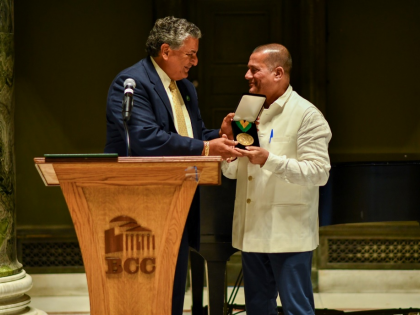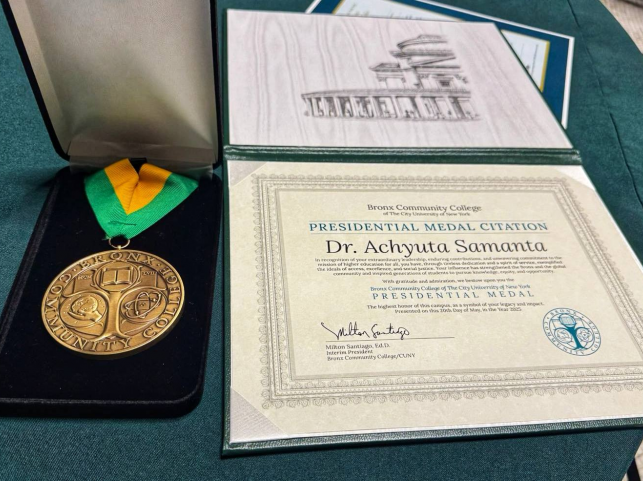CUNY Names Research Institute After KIIT-KISS Founder Dr. Samanta
By Impact Desk | Updated: May 26, 2025 19:53 IST2025-05-26T19:52:09+5:302025-05-26T19:53:04+5:30
Mumbai 26, May 2025: In a rare and historic gesture, renowned Indian educationist and social reformer Dr. Achyuta Samanta ...

CUNY Names Research Institute After KIIT-KISS Founder Dr. Samanta
Mumbai 26, May 2025: In a rare and historic gesture, renowned Indian educationist and social reformer Dr. Achyuta Samanta has been honoured in the United States with a research institute named after him. The City University of New York (CUNY), one of the oldest and most respected public university systems in the U.S., inaugurated the Achyuta Samanta India Initiative CUNY Crest Institute (ASIICCI) at a special event in New York this week. Dr. Samanta also received the university’s highest honour—the prestigious Presidential Medal—during the ceremony, making the moment doubly significant.
The institute, named after Dr. Samanta, will focus on fostering academic inquiry into Indian culture, heritage, and tribal communities, particularly highlighting Odisha. This marks the first time that a U.S.-based research institution has been named in honour of an Indian citizen, and it stands as a powerful acknowledgment of Dr. Samanta’s life work and India’s growing global influence in educational innovation and social development.
The initiative was the brainchild of Dr. Milton Santiago, President of Bronx Community College under the CUNY umbrella, who was deeply moved after his recent visit to KIIT and KISS in Bhubaneswar. “When I saw the scale and heart of Dr. Samanta’s work, I knew the world needed to learn from it,” Dr. Santiago said. “This institute is our way of saying that real change is possible—when one person dares to dream big and work tirelessly for others.”
He further added, “The Achyuta Samanta India Initiative will not only deepen American understanding of India’s rich tribal cultures and social fabric but also showcase how grassroots education models can disrupt cycles of poverty and uplift entire communities.”
During the inauguration, Dr. Samanta expressed deep gratitude and humility. “This recognition belongs not to me alone but to the people of Odisha, to every tribal child who believed in education, and to the incredible KIIT-KISS family that turned vision into reality”, he said
He continued, “This is not just a personal milestone—it’s a moment of pride for India. It shows that the world is watching, and the world is listening to what’s possible when education becomes a mission, not a privilege.”
Dr. Samanta’s journey is a living testament to that belief. Born into abject poverty in a remote village in Odisha, he lost his father at a young age and was raised by his mother under extremely difficult circumstances. Through sheer determination and an unshakable belief in education, he went on to establish KIIT (Kalinga Institute of Industrial Technology), now a world-class university with over 30,000 students, and KISS (Kalinga Institute of Social Sciences), the world’s largest residential institution for tribal children, providing free education, food, and holistic care.
KIIT has consistently ranked among top Indian institutions globally, while KISS has received international acclaim for its pioneering model that integrates academics with culture, sports, vocational training, and values. Together, these institutions represent a new model of social transformation—one that uses education as a tool not just for employment, but for dignity and empowerment.
What makes this moment truly special is the emotional and cultural bridge it builds between two worlds—between the cities of Odisha and the academic corridors of New York. According to official statements, the institute will support research by American students on Odisha’s art, heritage, and Dr. Samanta’s contributions to tribal development and education. While specific programming details are yet to be announced, the initiative is expected to promote deeper academic engagement with India’s indigenous knowledge systems and grassroots educational models.
A CUNY spokesperson shared, “We are proud to house an institute that not only honours Dr. Samanta’s legacy but also broadens our academic horizons. This is a step forward in embracing truly global perspectives in public education.”
CUNY, which serves more than 300,000 students from 122 countries, is known for its commitment to diversity and global learning. The creation of ASIICCI strengthens this vision and adds an India-centric dimension to its academic offerings. It is set to become a platform for meaningful collaboration between the U.S. and India on education, culture, and inclusive development.
The presentation of the Presidential Medal to Dr. Samanta added yet another milestone to his extraordinary journey. The medal—CUNY’s highest honour—was formally handed to him during the ceremony, symbolizing the university’s deep appreciation for his life’s work. Reserved for individuals whose contributions transcend borders and disciplines, the award acknowledges his exceptional service to humanity through education.
As he accepted the medal, Dr. Samanta shared, “This medal is not just a recognition of past work—it’s a reminder of the responsibility that lies ahead. If my journey from a small village to this global stage tells us anything, it’s that education can—and must—be the answer to inequality.”
This honour also marks a significant moment for India’s global image. It is a reminder that India’s most powerful exports are not just technology or industry—but stories of social innovation rooted in ancient values and futuristic vision. The naming of ASIICCI reinforces India’s growing presence in global education diplomacy and repositions indigenous models as globally relevant.
Dr. Samanta’s work has long demonstrated that meaningful change doesn’t require inherited privilege—just courage, clarity of purpose, and an unshakable belief in humanity. From feeding and educating thousands of tribal children at KISS to shaping one of the fastest-growing private universities in India through KIIT, his journey defies convention and inspires action.
The journey from a mud hut in rural Odisha to a prestigious research institution in New York is a story that will resonate across borders and generations. But this is not the end. The Achyuta Samanta India Initiative marks the beginning of a new era—one where education, empathy, and international collaboration will light the way forward for generations to come.
Open in app
